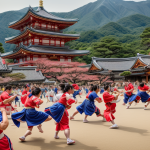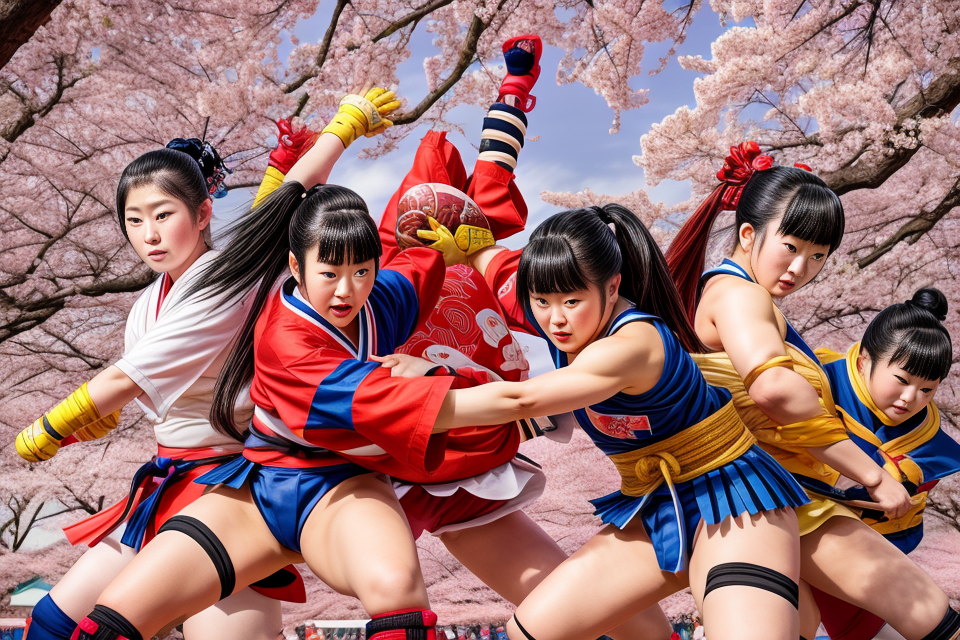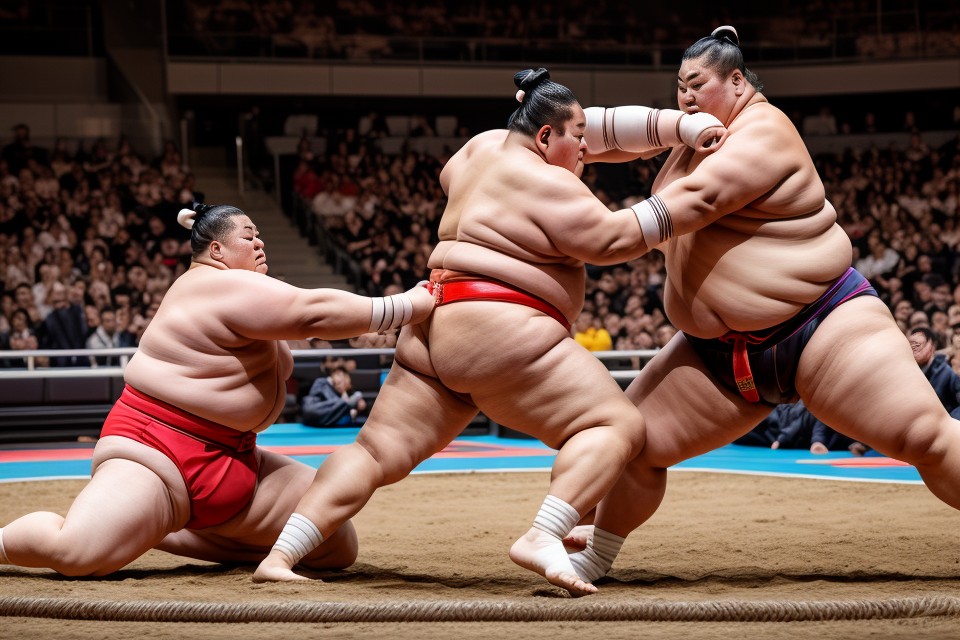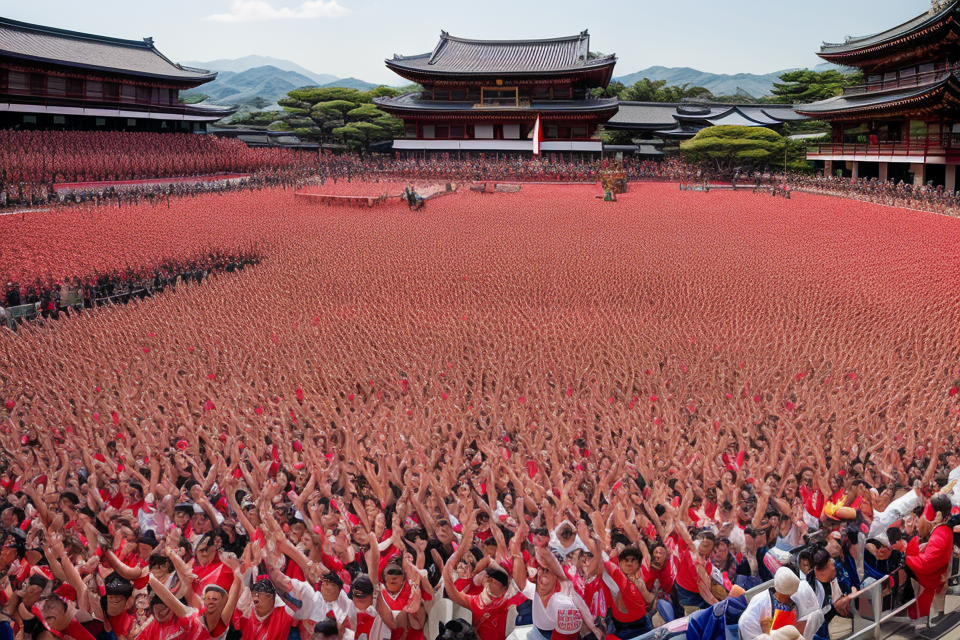The Japanese culture of sports is a fascinating topic that has captured the attention of people all over the world. From sumo wrestling to baseball, Japan has a rich history of unique and diverse sports that are deeply ingrained in its culture. The Japanese approach to sports is not just about winning, but also about discipline, respect, and tradition. In this article, we will explore what makes Japanese sports culture so unique and worth exploring. From the rigorous training methods to the spiritual aspect of sports, we will delve into the many facets of this intriguing topic. So, let’s get started and discover what makes Japanese sports culture so captivating!
Japanese sports culture is unique and worth exploring due to its combination of traditional and modern elements, strong emphasis on teamwork and discipline, and the passion and dedication of its participants. From martial arts such as judo and karate to popular sports like baseball and soccer, Japan has a rich history of sports and physical activity that is deeply ingrained in its culture. The country’s sports facilities and events are top-notch, and the level of competition is intense, making it an exciting and rewarding experience for those who participate or watch. Additionally, the Japanese sports culture places a strong emphasis on respect, discipline, and hard work, which can be beneficial for athletes of all ages and skill levels. Overall, Japanese sports culture is a fascinating and rewarding aspect of the country’s culture that is worth exploring for anyone interested in sports or physical activity.
Understanding the Roots of Japanese Sports Culture
Historical Influences on Japanese Sports
Ancient Traditions and Sports
Japan’s rich history has shaped its sports culture in many ways. The country’s ancient traditions and martial arts have influenced many sports and physical activities that are still popular today. For example, sumo wrestling, which originated in the Edo period (1603-1868), is one of Japan’s most well-known sports and continues to be practiced and enjoyed by many. Other traditional sports, such as kendo (sword fighting), judo (martial art), and kyudo (archery), have also had a significant impact on Japanese sports culture.
The Impact of Modernization on Japanese Sports
Japan’s rapid modernization in the late 19th and early 20th centuries had a profound impact on its sports culture. The introduction of Western sports, such as baseball, football, and basketball, helped to create a more diverse sports landscape in Japan. These sports were adopted and adapted to suit Japanese culture, leading to the development of unique variations that are now beloved by Japanese athletes and fans alike. Additionally, the growth of sports as a commercial industry in Japan has led to the creation of professional leagues and increased funding for sports programs at all levels, from elementary school to the Olympics.
Values and Philosophies Shaping Japanese Sports
The Importance of Teamwork and Respect
Japanese sports culture places a strong emphasis on teamwork and respect. These values are deeply ingrained in the country’s sports system, which is characterized by a collective approach to competition and a focus on cooperation and mutual support among team members. This collective mindset is reflected in many aspects of Japanese sports, from training methods to game strategies, and it contributes to the development of well-rounded athletes who are skilled both individually and as part of a team.
Embracing Fair Play and Sportsmanship
Fair play and sportsmanship are also central to Japanese sports culture. The country has a long-standing tradition of promoting fair and honest competition, and this ethos is evident in many aspects of Japanese sports, from the way athletes conduct themselves on the field to the rules and regulations that govern sports competitions. Japanese athletes are known for their respect for the rules and their opponents, and this respect is often reciprocated by foreign competitors who appreciate the integrity and professionalism of Japanese sports.
These values and philosophies shape the way Japanese athletes approach sports competition and contribute to the unique character of Japanese sports culture. They are also an important part of what makes Japanese sports worth exploring, as they offer a window into the country’s distinctive approach to sports and its place in Japanese society.
Embracing Diversity in Japanese Sports
The Wide Range of Sports in Japan
Japan is a country known for its unique and diverse sports culture. It is home to a wide range of sports, from popular sports such as sumo and soccer to niche sports and physical activities that are not as well-known outside of Japan. In this section, we will take a closer look at the variety of sports that are embraced by the Japanese people.
From Sumo to Soccer: A Sampling of Popular Sports
Sumo is one of the most well-known sports in Japan, with a history dating back over 1,000 years. It is a traditional wrestling sport that involves two competitors trying to force each other out of a circular ring. Soccer is also a popular sport in Japan, with a strong following of both professional and amateur leagues. Baseball is another popular sport, with many professional teams across the country and a passionate fan base.
Exploring Niche Sports and Physical Activities
In addition to the more well-known sports, Japan is also home to a variety of niche sports and physical activities. One example is kendo, a martial art that involves the use of bamboo swords and is practiced by people of all ages and skill levels. Another example is yachting, which has a strong following in Japan and hosts numerous international competitions.
Japan is also home to many outdoor activities, such as hiking, skiing, and camping. These activities are often seen as a way to connect with nature and promote a healthy lifestyle. Many of these activities are also tied to specific seasons, such as cherry blossom viewing during the spring and autumn leaf viewing during the fall.
Overall, the wide range of sports and physical activities in Japan reflects the country’s rich cultural heritage and its commitment to promoting a healthy and active lifestyle. Whether it’s sumo, soccer, or kendo, there is something for everyone in Japan’s diverse sports culture.
The Allure of Spectator Sports in Japan
Professional Leagues and Teams
Japan is renowned for its professional sports leagues and teams, which boast a rich history and unique characteristics that set them apart from their international counterparts. These leagues and teams not only captivate locals but also attract visitors from around the world. Let’s delve deeper into the world of Japanese professional sports.
Baseball, Soccer, and Beyond: The Biggest Draws
Baseball and soccer are undoubtedly the most popular sports in Japan, with the former being considered the national pastime. The professional baseball league, known as Nippon Professional Baseball (NPB), was established in 1936 and comprises six teams, each based in a different city. The league is known for its passionate fans, who fill the stands dressed in their team’s colors, waving flags, and singing songs throughout the game.
Soccer, or football as it’s known in most countries, has also gained immense popularity in Japan, especially after the country hosted the 2002 FIFA World Cup. The J.League, established in 1992, is the top professional soccer league in Japan and consists of 20 teams. The league has attracted international players and coaches, contributing to its growth and success.
Beyond baseball and soccer, other sports such as rugby, volleyball, and sumo wrestling also have professional leagues in Japan. Each sport has its unique appeal and dedicated fan base, showcasing the diversity of Japanese sports culture.
Following Your Favorite Teams Abroad
Japanese sports fans are known for their dedication and commitment to their favorite teams, even when they travel abroad. Many fans make it a point to attend games of their teams when they are playing overseas, showcasing their support and enthusiasm for their clubs. This has led to the development of organized fan clubs and supporters’ groups, which often collaborate with foreign fans to create a lively atmosphere during matches.
In addition, the growing popularity of online platforms has made it easier for Japanese sports fans to connect with other fans from around the world. Social media groups, online forums, and fan sites provide a platform for fans to discuss their teams, share news and updates, and engage in friendly banter with like-minded individuals.
The dedication and passion of Japanese sports fans, both in Japan and abroad, contribute to the unique and vibrant sports culture that the country has to offer.
Stadium Culture and Fan Etiquette
Tailgating and Matchday Rituals
In Japan, the concept of tailgating is known as “gates opening” or “gates opening party.” This is a pre-match event where fans gather outside the stadium to drink, eat, and socialize. The gates opening party is an integral part of the matchday experience, as it allows fans to build excitement and camaraderie before the game. Fans often bring their own food and drinks, or purchase from street vendors, while they wear their team’s colors and engage in friendly banter with rival fans.
Navigating Japanese Stadiums with Confidence
Japanese stadiums have their unique atmosphere, and fans are expected to adhere to certain rules and etiquette to ensure a pleasant experience for everyone. One of the most important aspects is the seating arrangement. In Japanese stadiums, fans are seated in assigned seats, and it is essential to respect the views of others by not standing up or blocking the view of other spectators. Additionally, it is customary to take off your shoes before entering the seating area, as it is considered respectful and clean.
Furthermore, Japanese fans are known for their quiet and reserved behavior during the match. It is common to see fans silently cheering for their team, and refraining from excessive noise or rowdiness. This behavior is in line with the Japanese culture’s emphasis on respect and harmony, and it contributes to a more peaceful and enjoyable experience for all fans in the stadium.
Sports Tourism in Japan: Participating in the Action
Joining the Fun: Sports-Themed Travel Packages
Hiking and Trekking in Japan’s Scenic Areas
Discovering Japan’s Natural Beauty
Japan’s diverse landscape offers numerous opportunities for outdoor enthusiasts to explore its scenic areas through hiking and trekking. The country boasts numerous national parks, mountain ranges, and coastal trails that provide breathtaking views and challenging terrain for experienced and novice hikers alike. From the rugged peaks of the Japanese Alps to the picturesque Shirakawa-go village, hikers can immerse themselves in Japan’s natural beauty while participating in a variety of sports-themed travel packages.
Traditional Japanese Guides and Equipment
Japanese sports tourism companies often provide experienced guides who are knowledgeable about the local flora and fauna, as well as the history and culture of the regions visited. These guides are usually trained in wilderness safety and first aid, ensuring the safety and well-being of hikers during their treks. In addition, sports tourism companies offer a range of equipment rentals, including hiking boots, backpacks, and camping gear, to ensure that hikers have a comfortable and enjoyable experience.
Exploring Culinary and Cultural Experiences
Savoring Japan’s Culinary Delights
Japan’s unique sports culture is not only limited to its scenic areas and outdoor activities. Sports tourism companies also offer a variety of culinary experiences that allow visitors to savor Japan’s rich and diverse cuisine. From sushi-making classes to sake tastings, these experiences provide an opportunity to learn about Japanese food culture and sample some of the country’s most famous dishes.
Immersing in Japanese Traditions and Customs
Sports tourism companies also provide a range of cultural experiences that allow visitors to immerse themselves in Japanese traditions and customs. From participating in a traditional tea ceremony to visiting a local temple or shrine, these experiences provide a unique insight into Japan’s rich cultural heritage. In addition, many sports tourism companies offer language classes and cultural tours, which provide visitors with a deeper understanding of Japan’s history, art, and literature.
By participating in sports-themed travel packages, visitors can explore Japan’s unique sports culture while immersing themselves in the country’s natural beauty, culinary delights, and rich cultural heritage. These packages offer a one-of-a-kind experience that combines physical activity, cultural immersion, and adventure, making Japan’s sports tourism industry a worthwhile and exciting destination for sports enthusiasts and adventure seekers alike.
Finding Your Perfect Sporting Adventure
Exploring the diverse sports culture of Japan can be an exhilarating experience for any sports enthusiast. With a plethora of options ranging from traditional martial arts to modern sports, Japan offers a unique and immersive experience for those seeking to challenge themselves both physically and mentally.
One of the best ways to immerse oneself in Japanese sports culture is by participating in local sports clubs and communities. These clubs provide an opportunity to connect with like-minded individuals and learn from experienced coaches and instructors. Many of these clubs offer programs that cater to visitors, allowing them to try out different sports and activities while also providing language support.
For those looking for a more adventurous experience, Japan also offers a range of outdoor sports and activities that allow visitors to explore the beautiful natural landscapes of the country. From hiking and mountain climbing to cycling and surfing, there is no shortage of options for those seeking a thrill.
One unique aspect of Japanese sports culture is the emphasis on mindfulness and spirituality. Many traditional sports and activities, such as judo and kendo, incorporate principles of meditation and inner focus, providing a holistic approach to physical fitness and well-being.
In addition to these traditional sports, Japan is also home to a vibrant sports industry that caters to modern sports enthusiasts. From professional baseball and soccer teams to state-of-the-art gyms and fitness centers, there is something for everyone in Japan’s sports scene.
Overall, exploring the sports culture of Japan can be a rewarding and enriching experience for anyone looking to challenge themselves, connect with others, and experience the unique blend of tradition and modernity that defines this fascinating country.
Safety Tips for Engaging in Sports and Adventure Activities
When participating in sports and adventure activities in Japan, it is important to prioritize safety. Here are some tips to help you stay safe and make the most of your experience:
Preparing for Your Adventure: Gear and Insurance
Before engaging in any sports or adventure activities in Japan, it is important to make sure you have the proper gear. Depending on the activity, you may need to rent or purchase equipment such as helmets, gloves, or specialized shoes. It is also important to ensure that you have the appropriate clothing for the activity, such as moisture-wicking fabrics for outdoor activities.
In addition to having the right gear, it is important to have the right insurance. Make sure you have travel insurance that covers you for the activities you plan to participate in, as well as any pre-existing medical conditions. It is also a good idea to purchase additional insurance that specifically covers adventure sports and activities.
Navigating Risks and Staying Safe During Your Activities
When participating in sports and adventure activities in Japan, it is important to be aware of the risks involved and take steps to mitigate them. Here are some tips to help you stay safe:
- Always listen to your instructor or guide and follow their instructions. They have experience and knowledge of the area and can help you avoid potential hazards.
- Make sure you are physically capable of participating in the activity. If you have any health concerns or physical limitations, make sure to inform your instructor or guide before participating.
- Pay attention to your surroundings and be aware of your environment. Knowing what to look out for can help you avoid accidents and injuries.
- Never engage in activities while under the influence of alcohol or drugs. This can impair your judgment and increase the risk of accidents and injuries.
- Always wear appropriate safety gear, such as helmets or pads, when participating in activities that may involve impact or collision.
- If you are participating in water-based activities, make sure to wear a life jacket or other flotation device when appropriate.
- Make sure to warm up and cool down properly before and after activities to avoid injury.
- If you are injured or in an accident, seek medical attention immediately. Delaying treatment can lead to more serious injuries or long-term health problems.
By following these safety tips, you can help ensure a safe and enjoyable sports tourism experience in Japan.
FAQs
1. What is the Japanese culture of sports?
Japanese sports culture is a unique blend of traditional and modern sports, with a strong emphasis on discipline, teamwork, and respect for others. Many sports in Japan have a deep cultural significance, and they are often accompanied by traditional customs and rituals. The culture of sports in Japan also values fair play and good sportsmanship, with a strong emphasis on the concept of “mens et manus” (mind and hand).
2. What makes Japanese sports culture unique and worth exploring?
Japanese sports culture is unique in many ways, from the emphasis on discipline and hard work to the intricate rules and customs associated with many sports. The culture of sports in Japan also values tradition and history, with many sports having a long and rich history dating back centuries. Additionally, the Japanese approach to sports is holistic, encompassing not just physical training but also mental and spiritual development. This makes the culture of sports in Japan a rich and rewarding area of exploration for anyone interested in the intersection of sports and culture.
3. What are some examples of traditional Japanese sports?
There are many traditional Japanese sports, each with its own unique customs and rituals. Some examples include sumo wrestling, which dates back to the Edo period and is known for its physical strength and mental toughness; kendo, a martial art that involves striking opponents with bamboo swords; and judo, a martial art that emphasizes throwing and grappling techniques. Other traditional sports include archery, kyudo, and naginata fencing.
4. How do Japanese sports reflect Japanese culture?
Japanese sports reflect many aspects of Japanese culture, including the importance of discipline, hard work, and respect for others. The customs and rituals associated with many sports in Japan also reflect the country’s rich cultural heritage, from the formal bowing and thanking of opponents in sports like kendo to the intricate etiquette of sumo wrestling. Additionally, many sports in Japan have a strong connection to nature, reflecting the country’s deep appreciation for the beauty and power of the natural world.
5. What is the role of sports in Japanese society?
Sports play a significant role in Japanese society, both as a source of national pride and as a means of promoting physical and mental health. Many sports in Japan have a strong following, with dedicated fans and enthusiasts both in Japan and around the world. Additionally, sports in Japan are often used as a tool for promoting social and cultural values, such as teamwork, discipline, and respect for others.










